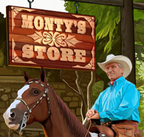Hi guys! Hope all is going well for you!
So woods and I have had our first couple of mini hacks!! Woohoo! I nearly wet myself with the thought but he has been fab, really good and really enjoying himself. We are going with one or two others keeping to walk round quiet roads. All good.
.
But, even though he is very happy to go out, really enjoys himself, when we get near home he gets very eager and wants to pick up the pace. Now I know they love going home but the first hint of warning bells are ringing for me. When we used to hack out all the time he was fine and then he started to pick up pace on the way home, which then lead to him bucking me off to get home when I held him back. (Probably more to it than this but I now this was a factor)
.
So, what can I do to nip this in the bud? I didn't address it before and I don't want to make that mistake again.
He is so happy at the new yard, a lot more chilled and we are working on a lot and he seems a lot more receptive to things in a calm way than before, so all plusses. But you can understand I need to 1.understand why he does it and then 2.controll it so he doesn't get frustrated and do something silly again.
.
cheers!
← back
Horse Behavior and Training
Going home

Rewards
Subscribe to Equus Online University and become a part of Monty's worldwide mission to leave the world a better place for horses and for people too.
Students automatically gain access to special rewards, such as exclusive discounts at the Monty Roberts Online Shop. Visit Monty Roberts Online Shop.



So glad things are going well and I agree; it is vital that this is sorted early on. The trick is to "mess with head a bit" Animals work by association and predicting what comes next, i.e. we've turned this way, that means home, gate is open, that means we are going through etc etc. You see dogs do it all the time, lead comes out, dog goes mad - it means walk! So mess with his head and take the meaning out of everything :-) Don't let him predict. Go out for your hack, get to the gate, "change your mind" go back. Go for a hack, on the way back, get off 300 yards before home, walk him in hand PAST the entrance, back again, past the entrance again, in the entrance, back home. Next time, do it in the saddle...every time, make it different, that way the only way that he knows what to do is by listening to you, not by thinking "Oh, I know this bit, let's go" (He of course is not "thinking" this but I am translating into human language haha). Vital to 'mix it up' but calmly and without fuss and in small stages. Good luck, keep us posted.
I believe that Vicci is right on point. This seems to be a matter of a thought process within your horse. every suggestion that Vicci stated is well founded. Another thought would be to look into the entire regimen that you and your horse go through in preparation to go on a ride. If there is any aspect of that preparation that your horse anticipates your next move ie. walk off after you have mounted from the block, should be corrected. Is he relaxed after the first mounting of the day and just content to stand patiently there? Horses can habituate the succeeding step in a learned sequence of training under tack. This precisely why I do so much of my first bit of training at liberty. I believe that this helps the connection between myself and the horse that I am working with at the moment. We share a thought process while focusing on each other`s and next move. Another thought that comes to mind is that while out there on the trail, and riding with other people. On a pre-arranged agreement, stop and get off while the others in the party remain mounted. Then face the others while they continue their ride off and walk your horse back to the barn while trying to match his breathing. Stroke him continually during the walk back. The very nature of your decision will challenge his instinct to be with the herd and separation anxiety. Be sure to reward him for being with you. This entire process, hopefully, will lead to an extinction burst of the undesirable behavior, but will probable take some time to come about. The connection with you needs to be stronger than his desire to ignore your riding cues while heading back to the barn. Your safety is paramount here. I hope that this helps. Bud
I would've said much the same thing Vicci posted, about messing with his head.
Home is always a lure for them. It usually means food, rest and company of his friends. Since it is hard to take away the friends part, but food can be rearranged. A friend of mine drove out in advance and placed a bucket of feed along the trail she followed instead of giving any at home. Mind you, she was going for getting a horse that understood the point in going out into the woods to begin with. LOL!
thanks for the advice! will start messing with his head! it's hard as we are so close I swear he reads my mind! Food is always an option for him (typical male!) so maybe ill leave food out but he only gets it when we go past the gate instead of going through..... I will keep you guys posted!
cheers again!
You probably have an extremely sensitive horse on your hands judging from your last comment of how he seemingly reads your mind. Our horses seem to invite us to match their focal powers of communication. That`s a good thing. Now it`s up to us to hold up our end of the partnership. You might look at some re-training with the join-up, only this time with his best buddies also in the round pen. He will have to choose who his join-up partner will be. This. will have to be at liberty of course. If you have never done something like this, it will cause your focus to be at it`s all-time sharpest as you enter the space to be shared. Your focal energy will come through big-time to the horses. Your ultimate goal here is for him to choose you. This may take some time, so be prepared to stay the course. You are asking him to challenge what comes naturally by choosing you as the leader of NOW. This will really sharpen his skills and yours as he is FREE to make the ultimate decision. It will lead to the building of trust for both of you. When we, as trainers and caretakers of these magnificent animals, allow the sharing of thoughts in the training process to inter-act, we open the door for the magic of the relationship to spring forth. I hope this helps you with him. Let us know how your are doing. Bud
It's a thought, can the horse read your mind ;) remember when being taught to ride you 'think' canter before you ask!
x
I like that comment Bud, .. Your ultimate goal here is for him to choose you. ..
That's what I wait for with the rescues.
x
Mel wrote: "It's a thought, can the horse read your mind ;) remember when being taught to ride you 'think' canter before you ask! "
.
I would say that depends on how you define "mind reading"!
The horse hardly picks up on your thought "canter" - even if he could "hear" that, how would he understand?
I believe the horse will sense the reaction in your body that will happen when you think of cantering.
.
Pay attention to yourself! Let's say you are sitting comfortably in an armchair but realize that you have to get up - what do you do? Breathe in a little deeper? Move your head? Tense your shoulders? There are million of tiny reflexes/reactions.
.
When you're thinking of getting a canter, your body will start to prepare for the aids, the motion of switching gates, keeping balance and breath. All of that, your (sensitive) horse will feel, and if it is used to the same signals coming, its body will eventually also respond on reflex.
Magic! No, not really! But close enough! :D
That's my two cents on the matter anyway. (Taught to me by a small dog that sensed every slight change in my body and always interpreted them as possible opportunities for either food or play.)
.
Mind you, an old school horse might never ever bother to start cantering "on a thought", because it is used to too many beginners moving around in all directions up there, so it will (if it is the "kind mentor" type of horse) wait for the correct and clear aid - just to be sure.
(Because last time I started cantering on a small signal, the being onboard started screaming and flailing both hands and legs, so no way I am doing that again!) ;) ;) ;)
Nicely put Kicki, like the last bit.
One of the things I teach even before the student has sat on the horse is to sit still. We have a balance bar with saddle on and it wobbles if they fidget, only when they balance and sit still will the saddle stop wobbling ;)
hi guys, thanks for your comments! I know it is out sub-conscious movements that tell them but sometimes I do think he reads minds! and vibes! I have tried a kind of join up when I had issues catching him in the field in the summer-he would go to his bf and start grooming him, then start herding them away from me. Have worked very hard using the 'catch your horse in the field' lessons plus making him move when he tried to groom his bf and keep the pressure on until he stopped and made myself a good place to be. And also used the 'oh look what I have found, this bucket of feed' trick so I look like I have made a good decision! and it has paid off- almost too much as he then tried to follow me under the electric as he didn't want me to leave!
.
But the going home, I can't pin point when it started or a trigger for why as we always hacked alone only rarely in company. And in my head we are going at the same pace as we were fine for so long. I will also say that we are going out bareback atm as he seems a lot more relaxed, responsive ect (another post to follow on everyone's views of that as it is more complex than it sounds!) so the balance thing, nothing will change much! The pace increases in walk and to trot but obviously do not want it get any faster or for him to have tantrum when I hold him back.
.
I have been out only once since hearing the first lot of advice and got off nearer the end and pretended it was it which did seem to help as I lead home, but he does seem to stay with more more on the ground anyway. So messing with his head will hopefully work!
.
Thanks again!
Glad it is working. These things do take time.
.
Have another suggestion for you that I was reminded of as a friend chatted about how he stopped his big gelding from careening home once they got to the end of the path in the woods and had to turn back.
Soon as the horse started "puffing up", he simply started to ride in circles - not too tight! 8-10m(25-30ft) across is fine if the surroundings allow for it - until the horse started to listen and work properly. Once it had calmed down, he gave it free reins and headed for home at a walk. If the horse started to increase the pace, he turned it back to circle work, and so on.
.
The message to the horse was that if it wanted to work that was fine, but this was how the energy would be spent; not in a beeline for home, but on a circle.
Good suggestion Kicki